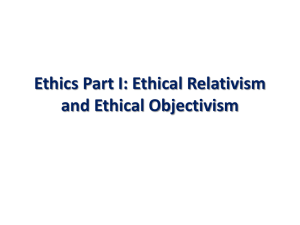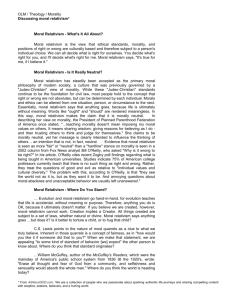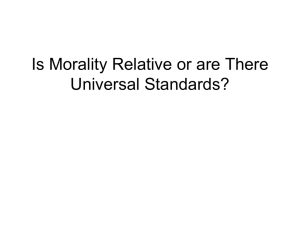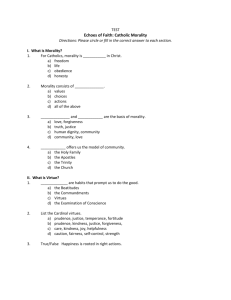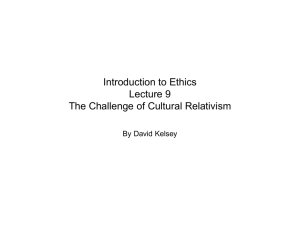WS Anti-Christian moralities MOR12
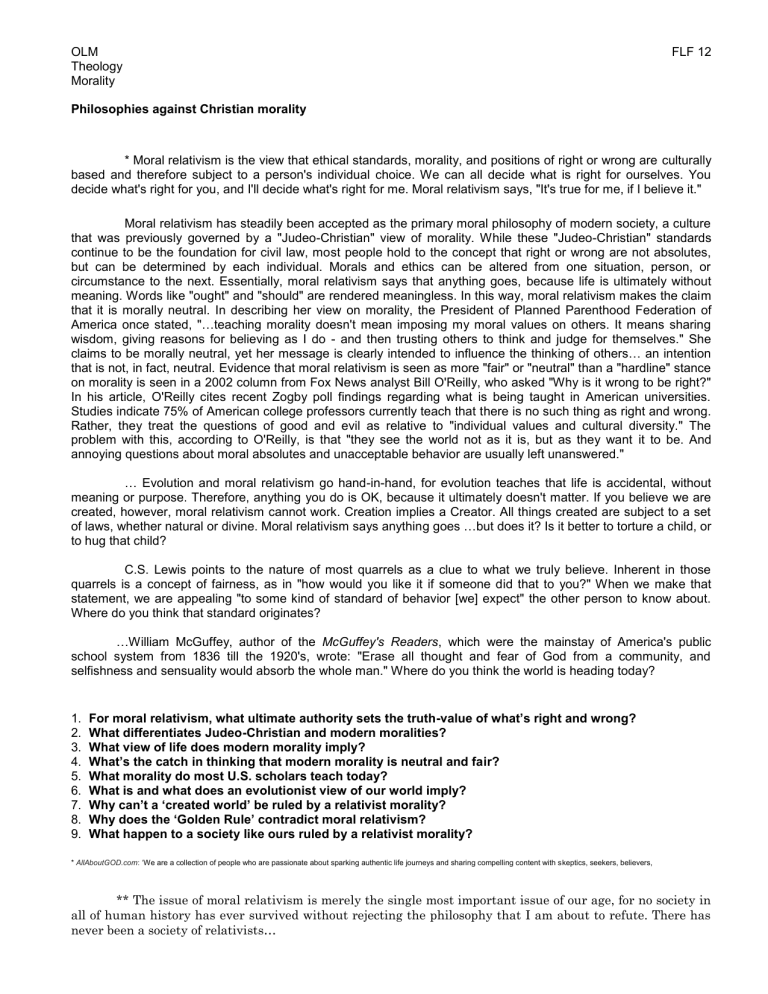
OLM
Theology
Morality
Philosophies against Christian morality
FLF 12
* Moral relativism is the view that ethical standards, morality, and positions of right or wrong are culturally based and therefore subject to a person's individual choice. We can all decide what is right for ourselves. You decide what's right for you, and I'll decide what's right for me. Moral relativism says, "It's true for me, if I believe it."
Moral relativism has steadily been accepted as the primary moral philosophy of modern society, a culture that was previously governed by a "Judeo-Christian" view of morality. While these "Judeo-Christian" standards continue to be the foundation for civil law, most people hold to the concept that right or wrong are not absolutes, but can be determined by each individual. Morals and ethics can be altered from one situation, person, or circumstance to the next. Essentially, moral relativism says that anything goes, because life is ultimately without meaning. Words like "ought" and "should" are rendered meaningless. In this way, moral relativism makes the claim that it is morally neutral. In describing her view on morality, the President of Planned Parenthood Federation of
America once stated, "…teaching morality doesn't mean imposing my moral values on others. It means sharing wisdom, giving reasons for believing as I do - and then trusting others to think and judge for themselves." She claims to be morally neutral, y et her message is clearly intended to influence the thinking of others… an intention that is not, in fact, neutral. Evidence that moral relativism is seen as more "fair" or "neutral" than a "hardline" stance on morality is seen in a 2002 column from Fox News analyst Bill O'Reilly, who asked "Why is it wrong to be right?"
In his article, O'Reilly cites recent Zogby poll findings regarding what is being taught in American universities.
Studies indicate 75% of American college professors currently teach that there is no such thing as right and wrong.
Rather, they treat the questions of good and evil as relative to "individual values and cultural diversity." The problem with this, according to O'Reilly, is that "they see the world not as it is, but as they want it to be. And annoying questions about moral absolutes and unacceptable behavior are usually left unanswered."
… Evolution and moral relativism go hand-in-hand, for evolution teaches that life is accidental, without meaning or purpose. Therefore, anything you do is OK, because it ultimately doesn't matter. If you believe we are created, however, moral relativism cannot work. Creation implies a Creator. All things created are subject to a set of laws, whether natural or divine. Moral relativism says anythin g goes …but does it? Is it better to torture a child, or to hug that child?
C.S. Lewis points to the nature of most quarrels as a clue to what we truly believe. Inherent in those quarrels is a concept of fairness, as in "how would you like it if someone did that to you?" When we make that statement, we are appealing "to some kind of standard of behavior [we] expect" the other person to know about.
Where do you think that standard originates?
…William McGuffey, author of the McGuffey's Readers , which were the mainstay of America's public school system from 1836 till the 1920's, wrote: "Erase all thought and fear of God from a community, and selfishness and sensuality would absorb the whole man." Where do you think the world is heading today?
1. For moral relativism, what ultimate authority sets the truthvalue of what’s right and wrong?
2. What differentiates Judeo-Christian and modern moralities?
3. What view of life does modern morality imply?
4. What’s the catch in thinking that modern morality is neutral and fair?
5. What morality do most U.S. scholars teach today?
6. What is and what does an evolutionist view of our world imply?
7. Why can’t a ‘created world’ be ruled by a relativist morality?
8. Why does the ‘Golden Rule’ contradict moral relativism?
9. What happen to a society like ours ruled by a relativist morality?
* AllAboutGOD.com
: ‘
We are a collection of people who are passionate about sparking authentic life journeys and sharing compelling content with skeptics, seekers, believers,
** The issue of moral relativism is merely the single most important issue of our age, for no society in all of human history has ever survived without rejecting the philosophy that I am about to refute. There has never been a society of relativists…
…[Today,] morality is a fog of feelings. That is why to [many], as Chesterton said, "Morality is always dreadfully complicated to a man who has lost all his principles." Principles mean moral absolutes, unchanging rocks beneath the changing waves of feelings and practices. Moral relativism is a philosophy that denies moral absolutes. That thought to me is the prime suspect—public enemy number one. The philosophy that has extinguished the light in the minds of our teachers, and then their students, and eventually, if not reversed, will extinguish our whole civilization…
We must define our terms when we begin. Moral relativism usually includes three claims: That morality is first of all changeable; secondly, subjective; and third, individual. That it is relative first to changing times; you can't turn back the clock. Secondly, to what we subjectively think or feel; there is nothing good or bad, but thinking makes it so. And thirdly, to individuals; different strokes for different folks. Moral absolutism claims that there are moral principles that are unchangeable, objective, and universal.
10. What does history teach us about moral relativism?
11. Why does moral relativism ‘imperil our civilization’?
12. What are the three claims of moral relativism?
13. For moral relativism, what makes a human act good or bad?
14. What are the three claims of moral absolutism?
** Peter Kreeft, Ph.D., is a professor of philosophy at Boston College. He is a regular contributor to several Christian publications, is in wide demand as a speaker at conferences, and is the author of over 45 books.
*** 32. Certain currents of modern thought have gone so far as to exalt freedom to such an extent that it becomes an absolute, which would then be the source of values. This is the direction taken by doctrines which have lost the sense of the transcendent or which are explicitly atheists. The individual conscience is accorded the status of a supreme tribunal of moral judgment, which hands down categorical and infallible decisions about good and evil. To the affirmation that one has a duty to follow one's conscience is unduly added the affirmation that one's moral judgment is true merely by the fact that it has its origin in the conscience. But in this way the inescapable claims of truth disappear, yielding their place to a criterion of sincerity, authenticity and "being at peace with oneself", so much so that some have come to adopt a radically subjectivist conception of moral judgment.
As is immediately evident, the crisis of truth is not unconnected with this development. Once the idea of a universal truth about the good, knowable by human reason, is lost, inevitably the notion of conscience also changes.
Conscience is no longer considered in its primordial reality as an act of a person's intelligence, the function of which is to apply the universal knowledge of the good in a specific situation and thus to express a judgment about the right conduct to be chosen here and now. Instead, there is a tendency to grant to the individual conscience the prerogative of independently determining the criteria of good and evil and then acting accordingly. Such an outlook is quite congenial to an individualist ethic, wherein each individual is faced with his own truth, different from the truth of others. Taken to its extreme consequences, this individualism leads to a denial of the very idea of human nature.
33. Side by side with its exaltation of freedom, yet oddly in contrast with it, modern culture radically questions the very existence of this freedom. A number of disciplines, grouped under the name of the "behavioral sciences", have rightly drawn attention to the many kinds of psychological and social conditioning which influence the exercise of human freedom. Knowledge of these conditionings and the study they have received represent important achievements, which have found application in various areas, for example in pedagogy or the administration of justice.
But some people, going beyond the conclusions, which can be legitimately drawn from these observations, have come to question or even deny the very reality of human freedom.
The text above makes mention of 2 opposite modern views about human freedom and it shows that both of them contradict traditional Christian teaching?
15. What are these opposite modern views called?
16. What is human freedom for each of them?
*** Veritatis Splendor, encyclical letter, by pope John Paul II, regarding certain fundamental questions of the church's moral teaching.



